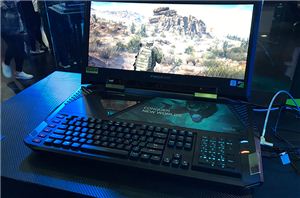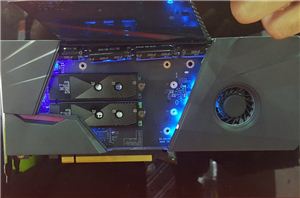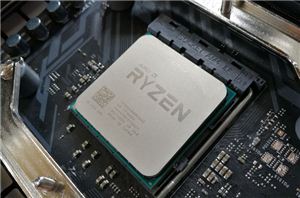A USB Stick as an SSD? A New Silicon Motion SM3282 Single-Chip Controller for USB SSDs
by Anton Shilov on May 31, 2019 3:00 PM EST- Posted in
- SSDs
- Storage
- Silicon Motion
- 3D NAND
- External SSDs
- Computex 2019
- SM3282

Silicon Motion has introduced its first single-chip controller for portable USB SSDs. The SM3282 promises to enable makers of portable drives to offer up to 400 MB/s sequential read speeds in a cost-efficient manner previously unachievable by external SSDs.
Silicon Motion’s SM3282 chip packs a USB 3.0 (aka USB 3.2 Gen 1) controller alongside an SSD controller featuring 2 NAND channels with 4 CE (Chip Enables) per channel, integrated 3.3V/2.5V/1.8V/1.2V voltage regulators, and other necessary things. The chip comes in a 68-pin QFN package and supports the latest types of 3D NAND memory (including 3D TLC and 3D QLC memory featuring up to 96 layers) from all leading suppliers of flash. It also supports both USB Type-A as well as USB Type-C connectors.
Previously, makers of external SSDs had to use a USB-to-PCIe bridge alongside an SSD controller to build their products, which greatly increased BOM costs as well as the final price. The SM3282 packs all the necessary functionality into a single chip and thus reduces BOM cost of external SSDs.
As far as performance is concerned, the SM3282 can enable external SSDs featuring up to 400 MB/s sequential read and write speeds. Meanwhile, producers of actual SSDs tend to use different types of memory with different interface speeds, so performance of actual devices will vary.
This week Silicon Motion is demonstrating prototype external SSDs based on the SM3282 at Computex. Expect commercial drives powered by the controller to be available in the coming quarters at a variety of price bands.
| Want to keep up to date with all of our Computex 2019 Coverage? | ||||||
 Laptops |
 Hardware |
 Chips |
||||
| Follow AnandTech's breaking news here! | ||||||















46 Comments
View All Comments
AnTech - Friday, May 31, 2019 - link
USB 3.1 Type-C Generation 2 (10 Gbps) and Thunderbolt 3 (40 Gbps, supporting the former). With Intel Optane (XPoint) for faster random read and write (IOPS). To boot Mac and work from it all day long. And NO thermal throttling!StormyParis - Friday, May 31, 2019 - link
Let's ask the really important question: what's beneath the "portable" tacked onto the sign ?Potable ? Probable ? Torpable ? Palpable ?
futrtrubl - Friday, May 31, 2019 - link
That's what I want to know as well.eastcoast_pete - Friday, May 31, 2019 - link
Added guesses for the original word now covered up: "culpable", and, more likely "capable". Think of all the confidential files one can suck down in a few minutes and high-tail it out of there. No more need to try and sneak out a laptop.Joel Kleppinger - Saturday, June 1, 2019 - link
It's probably just a misspelling since the space for the word seems the same.name99 - Saturday, June 1, 2019 - link
My guess is someone unfamiliar with English misspelt, likely “protable”.Easy mistake to make if English is not your first language.
Lord of the Bored - Sunday, June 2, 2019 - link
Pro tables are the best.ozzuneoj86 - Friday, May 31, 2019 - link
Interesting idea, but I'd be more than a little worried about something that huge sticking out of a USB port. Presumably, these won't be real cheap...Skeptical123 - Friday, May 31, 2019 - link
The usb drives in the photos are just demo/engineering models. Silicon Motion only makes the driver (the tiny square chip by the USB port).hojnikb - Sunday, June 2, 2019 - link
companies like SM usually make reference designs (that includes controller, pcb and firmware for different flash manufacturers) which are used by most companies, because its cheaper than designing your own.